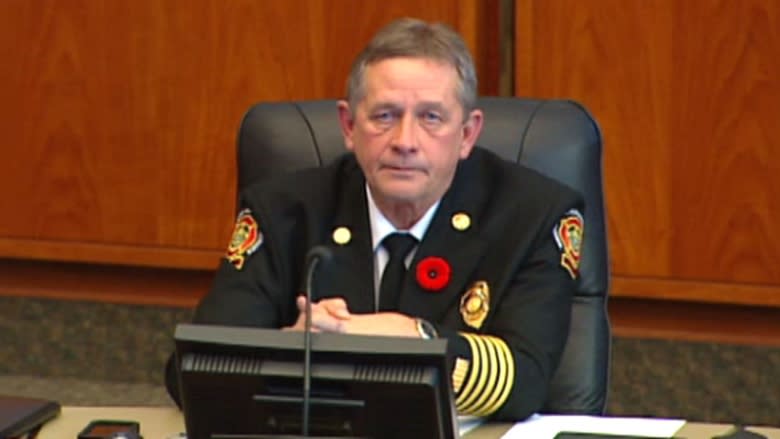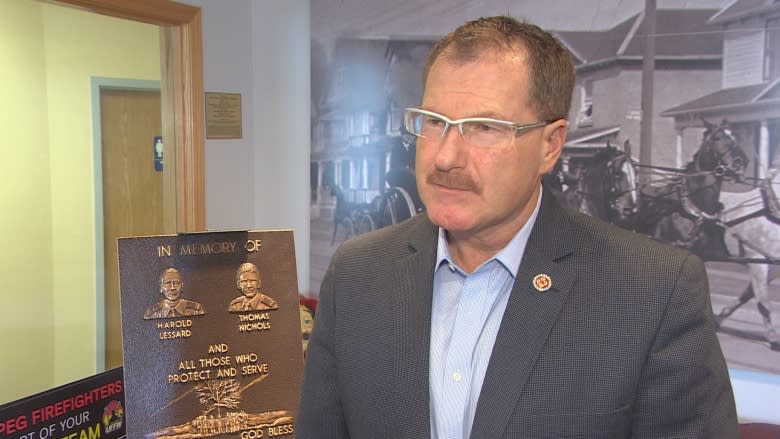Former Winnipeg fire chief tried to end union president's pay agreement months before he was fired
The former chief of the Winnipeg Fire Paramedic Service says he tried to end a deal made by his predecessor that required the city to pay the full salary and benefits of firefighter union president Alex Forrest.
"This is the taxpayers' money we're talking about here," said Reid Douglas, former chief of the Winnipeg Fire Paramedic Service, in an interview with CBC News.
Douglas said he learned of the deal in 2008, when he returned to Winnipeg to work as deputy chief in the fire paramedic service. He began his firefighting career in Winnipeg in 1974, but had left in 2000 to run the fire department in North Vancouver and then Yellowknife.
"When I came back in January 2008, this agreement was in place, and we didn't question it. It was something that was done by the chief and that was that," Douglas said.
Douglas believes the deal was struck in 2007 between Alex Forrest, the president of the United Fire Fighters of Winnipeg, and Jim Brennan, who had just been promoted to chief that year.
In 2011, Brennan retired and Douglas took over the job. He said he started looking into the agreement in 2012 after learning that based on seniority, Forrest was up for promotion to lieutenant — a move that would cost taxpayers more money since the city was still on the hook for the union leader's pay and benefits.
"I could never find anything in writing on it. And I had human resources search. I searched the files myself for it and there was nothing in the chief's files or anything that I knew of, " he said.
Douglas said he asked Forrest about it and he confirmed no documentation existed on the deal. He said Forrest told him it was a verbal agreement Forrest and Brennan had honoured.
"It was a department issue, it's something that the former chief had agreed to and I thought it was up to the current chief to end that practice," said Douglas.
Douglas said he told Forrest the city was no longer prepared to cover his salary — news he said the union boss didn't take very well.
"He went ballistic. [He said] 'I had an agreement' and I said 'I don't care, Alex. You know. We're not only paying you a lot of money, we're also backfilling your position.'"
"We've got nothing in writing and any agreement he had with the former chief — if it's not formalized [it] doesn't hold any water with me," Douglas said he told Forrest.
Douglas said prior to 2007, the UFFW president's job was a part-time position, so Forrest would have still been required to work on a platoon as an active firefighter.
Since 1985, there has been a clause in the collective agreement between the City of Winnipeg and the UFFW, in which the city agrees to cover up to 1,050 hours a year to backfill firefighters on union business. Anything over and above that, the UFFW has to pay back. Douglas believes as part of the arrangement between Brennan and Forrest, the city agreed to continue paying all of Forrest's salary and benefits, even though he wasn't required to work on a platoon.
"He didn't have to give up anything. It wouldn't have been a negotiation, it was an arrangement between him and Jim Brennan," said Douglas.
Douglas sent letter to Forrest in 2013
Douglas said in early 2013, he wrote a formal letter to Forrest advising him the UFFW would have to pay his salary if he intended to work for the union full time. Douglas said otherwise, Forrest would be required to requalify for active duty and return to work as a firefighter if he wanted a promotion.
Douglas didn't keep the official letter because he said it would have been against city rules. But in a draft copy he provided to CBC, Douglas laid out the conditions in which the city expected Forrest to adhere to.
"As you have not been in the workforce for a considerable period of time in an operational capacity; years in fact under an agreement you allegedly had with former Chief James Brennan; and given the highly important responsibility all our officers bear for both the leadership and safety of our staff in a highly dangerous profession, the following will apply prior to your promotion occurring or becoming permanent," Douglas wrote in the draft letter.
The undated letter laid out five conditions which Forrest was told he would have to fulfil in order to qualify for active duty and promotion.
"It should be noted that for the lengthy term of your absence from Operations, the City of Winnipeg has been maintaining your status as active on the roster and payroll," the draft letter said.
Douglas said Forrest told him he wanted to bring the deal to the negotiating table when the UFFW sat down with the city to hammer out a new collective agreement in 2014.
Douglas said he told Forrest he could do whatever he wanted, but that his position would not change on the matter.
Douglas was fired in September 2013 amid a scathing audit on a controversial land swap deal. But before he left, he said he made sure to let city staff know about the unwritten deal.
"I did make it clear to the city's negotiating team this is something that I wanted, that I served notice and this was going to end the practice with paying his salary," said Douglas.
He believes that is what led to the city renegotiating back 40 per cent of Forrest's salary from the UFFW in 2014.
Forrest responds
Alex Forrest doesn't deny the city paid 100 per cent of his salary while he worked as union president but said he was still taking regular firefighting shifts up until two Winnipeg fire captains were killed in a blaze in 2007.
Forrest said he took a year off from active duty to focus on protecting other firefighters from falling victim to the same tragedy.
"That was just enormous when it came to the two deaths of the firefighters," Forrest said.
"I was working with the province, I was working with the city on everything from health and safety, new protocols and everything."
Forrest said in addition to that, he was tasked with helping firefighters transition into their new EMS roles.
"In 2007, we agreed that firefighters were going to be paramedics as a condition of employment. So there was a myriad of issues we had to deal with," said Forrest.
"It's true that the city paid 100 per cent of my salary. But it was in the collective agreement."
The UFFW president said two clauses in the collective agreement — found on pages 54 and 55 of the document — allowed Brennan the ability to divert Forrest's pay from the union to taxpayers.
"It's under article 20.4 and 20.6.… It says in there that any other committee meetings that the city put forward on on a mutual basis, the city would pay for stand ins."
A city spokesperson did not say if the official document was in the chief's files and wouldn't respond to the draft letter.
"City of Winnipeg paid 100% of the UFFW president's firefighter salary between 1997 and 2014, as per the terms set out in the collective agreements," a spokesperson said in an email to CBC.
The email went on to say through 2009, Forrest was granted paid leave to perform union duties and a stand-in was brought in to cover his firefighting duties. The city covered that cost up to 1,050 hours a year, then the union was expected to pick up the additional tab.
"From 2010 to 2014, the coverage of his absence was paid by the City if a replacement was required. When the UFFW pays for the stand-in, the UFFW pays that firefighter directly — no payment would come through the City of Winnipeg. Prior to 2014, the City did not seek reimbursement of union leave granted to UFFW that exceeded 1,050 hours in a calendar year as per the terms set in the collective agreements. There are no records of reimbursement from UFFW for union leave paid prior to 2014," the city spokesperson said.
Forrest doesn't remember receiving the letter but confirmed the issues in the draft were raised at negotiations. When asked how he got the city to agree to pay 60 per cent of his salary in 2014, Forrest said he out-negotiated them.
"That's what negotiations is," he said.
Forrest said if he went back to active duty the city would still have to pay his salary any time he worked as a firefighter. And because he was serving on a number of committees within the WFPS the city would have to pay for that time, too, as per the collective agreement.
"They could enforce the collective agreement as is but they still had to pay 100 percent of my salary.… So what we did is we negotiated and the city agreed," said Forrest.
When asked what the UFFW had to give up in order to get the city to pay 60 per cent of his salary, Forrest said "We didn't give up anything."
"The city is a sophisticated client. The city, they have a team of lawyers — they have a whole floor at city hall of lawyers. We negotiated and it was brought forward to city council," said Forrest.
"The city councillors and EPC knew what they were signing."
Forrest said councillors agreed on the arrangement unanimously in 2014.
"They are poorly run when it comes to record keeping and quite frankly we take advantage of that when it comes into negotiations," he said.
Tough couple weeks: Forrest
Forrest said it's been a difficult couple weeks since news of the cost-sharing agreement hit the media, because the focus has been on the union president and not the city's role in the deal.
"It's been really unfair.… It's turned into a personal attack upon me. It's been extremely hard on me, my friends, especially the firefighters in the halls," said Forrest.
"It feels as if it's an attack upon me, and that's the way my family sees it. 'Cause you say 'Alex Forrest,' you don't say 'UFFW negotiated this.' You say Alex Forrest did it … but really it's the union," he said.
In addition to his $116,000 fire captain salary, Forrest said he receives about $30,000 more from the UFFW and about $8,000 to $10,000 from the International Association of Fire Fighters for his work with the two labour groups.
Forrest doesn't see an issue with taxpayers covering part of his salary because the work he's done doesn't just help his members, but also protects the citizens of Winnipeg.
"I believe unions provide a big service to the citizens in the city of Winnipeg, we assist the city, in running of the city, we continue to health and safety, it's our job to work with the city. It isn't just about representing our members," said Forrest.
He said if city council wants to end the practice, the UFFW will gladly negotiate a different deal in the next round of bargaining.
"I have said that many times if the city feels it's a huge issue, we will sit down and attempt to find a win-win settlement in the next round of negotiations. We are willing to sit down and negotiate this," he said. "And I don't have to because the agreement is so strong."
Forrest said the agreement will remain in effect until he steps down as president.
Can't see the draft letter because you're on mobile? Find it online here.



